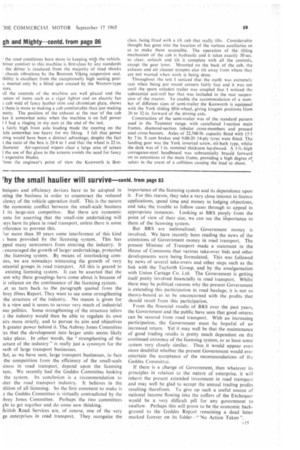'hy the small haulier will survive--contd. from page 83
Page 89

If you've noticed an error in this article please click here to report it so we can fix it.
hniques and efficiency devices have to be adopted in ming the business in order to counteract the reduced ciency of the vehicle operation itself. This is the nature the economic conflict between the small-scale business
its large-size competitor. But there are economic sons for asserting that the small-size undertaking will rays have its place in road transport, unless there is some :rference to prevent this.
or more than 30 years some interference of this kind ; been provided by the licensing system. This has pped many newcomers from entering the industry. It ; encouraged the growth of larger undertakings, protected the licensing system. By means of interlocking cornties, we are nowadays witnessing the growth of very istantial groups in road transport. All this is geared to existing licensing system. It can be asserted that the son why these groupings have come about is because of ir reliance on the continuance of the licensing system. _et us turn back to the paragraph quoted from the brey .Mnes Report. They want to see some strengthening the structure of the industry. No reason is given for .h a view and it seems to savour very much of industrial Ner politics. Some strengthening of the structure infers t the industry would then be able to regulate its own Airs more strictly, and to pursue its aim and objectives h greater power behind it. The Aubrey Jones Committee :es that the development into larger units seems likely take place. In other words, the "strengthening of the ucture of the industry" is really just a synonym for the iwth of large transport businesses.
3ut, as we have seen, large transport businesses, in face the competition from the efficiency of the small-scale siness in road transport, depend upon the licensing tern. We recently had the Geddes Committee looking the system. Its conclusion is a recommendation to Ater the road. transport industry. It believes in the olition of all licensing. So the first comment to make is .t the Geddes Committee is virtually contradicted by the ibrey Jones Committee. Perhaps the two committees ffht to get together and do some new thinking.
British Road Services are, of course, one of the very ge enterprises in road transport. They recognize the importance of the licensing system and its dependence upon it. For this reason, they take a very close interest in licence applications, spend time and money in lodging objections, and take the trouble to follow cases through to appeal in appropriate instances. Looking at BRS purely from the point of view of their size, we can see the importance to them of the licensing system.
But BRS are nationalized; Government money is involved. We have recently been reading the news of the extensions of Government money in road transport. The present Minister of Transport made a statement in the House of Commons that various take-over bids and other developments were being formulated. This was followed by news of several take-overs and other steps such as the link with the Tayforth Group, and by the amalgamation with Union Cartage Co. Ltd. The Government is getting itself pretty involved financially in road transport. Whilst there may be political reasons why the present Government is extending this participation in road haulage, it is not so theory-bound as to be unconcerned with the profits that should result from this participation.
From the financial results of BRS over the past years, the Government and the public have seen that good returns can be secured from road transport. With an increasing participation, the Government must be hopeful of art increased return. Yet it may well be that the maintenance of good trading results is pretty much dependent on the continued existence of the licensing system, or at least some system very closely similar. Thus it would appear even more doubtful whether the present Government would ever entertain the acceptance of the recommendations of the Geddes Com mi t tee.
If there is a change of Government, then whatever its principles in relation to the nature of enterprise, it will inherit the present extended investment in road transport and may well be glad to accept the annual trading profits resulting therefrom. To give up such a useful source of national income flowing into the coffers of the Exchequer would be a very difficult pill for any government to swallow. Perhaps this will prove to be the economic background to the Geddes Report remaining a dead letter marked forever on its folder--" No Action Taken ".




















































































































































































